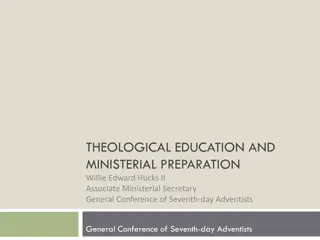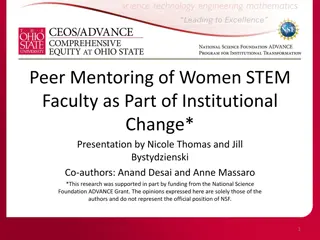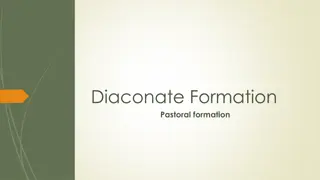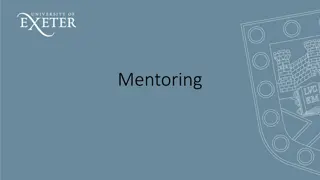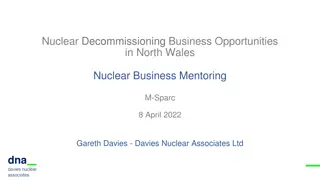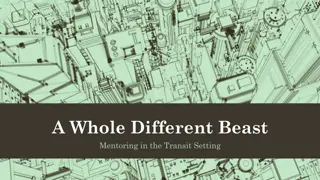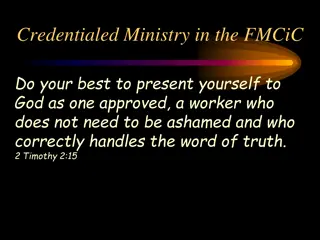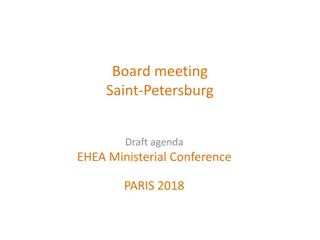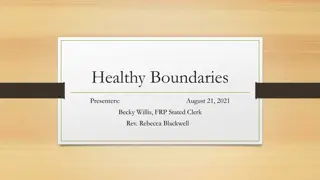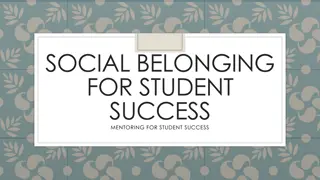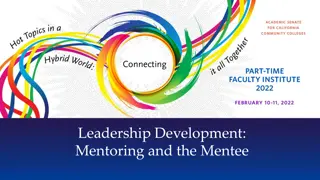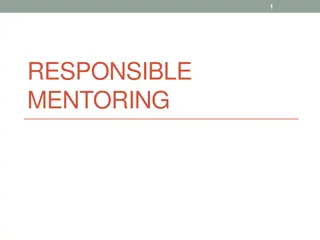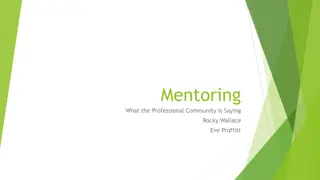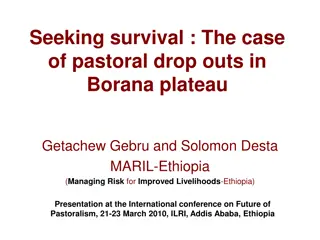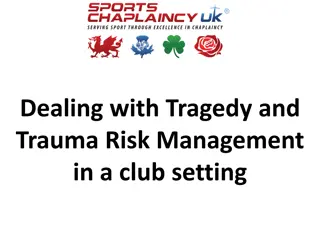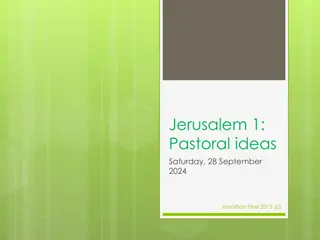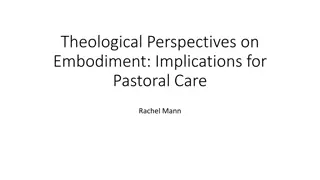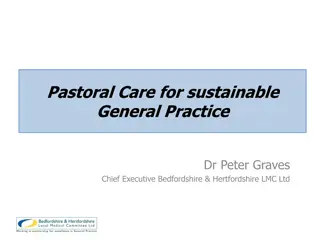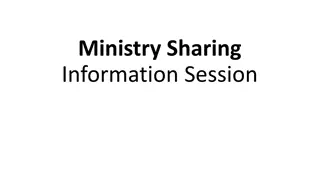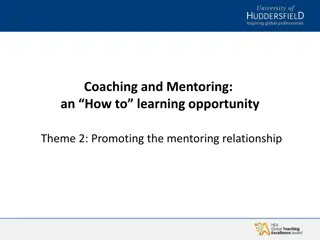Understanding the Ministerial Mentoring Experience (MME) for Pastoral Ministry
The Ministerial Mentoring Experience (MME) is a crucial aspect of the MA in Pastoral Ministry (MAPM) program, designed to provide mentoring and guidance to pastors for effective ministry. Mentors play a key role in shaping the lives of program applicants, fostering growth and development in pastoral formation. This comprehensive guide covers the MAPM program, course formats, duration, mentoring commitment, and the importance of mentoring in ministry based on biblical examples.
Download Presentation

Please find below an Image/Link to download the presentation.
The content on the website is provided AS IS for your information and personal use only. It may not be sold, licensed, or shared on other websites without obtaining consent from the author. Download presentation by click this link. If you encounter any issues during the download, it is possible that the publisher has removed the file from their server.
E N D
Presentation Transcript
MINISTERIAL MENTORING EXPERIENCE (MME) FOR MA IN PASTORAL MINISTRY (MAPM) PASTORS MENTOR TRAINING/GUIDELINES
WHY AM I RECEIVING THIS? You re receiving this information because one of our MA in Pastoral Ministry (MAPM) applicants has contacted you about being his/her mentor for continued pastoral formation during the time they are in the MAPM program.
THIS IS WHAT YOURE SIGNING UP FOR: While it is an honor to be invited to help shape someone s life for more effective ministry, you likely have some questions about what this involves before you say yes to this opportunity. We hope to answer the questions in the information that follows. Please read carefully.
1. WHAT IS THE MAPM PROGRAM? The MAPM program, offered in both English and Spanish, is a 48-credit professional degree offered through the Seventh-day Theological Seminary at Andrews University. The ideal candidate has: a minimum of 5 years of pastoral experience is at least 35 years old has a bachelor s degree from an accredited school (Exceptions are by petition.)
2. WHAT IS THE FORMAT FOR THE COURSES? Courses are taken via 1-week-long intensives and are offered in all nine unions. Students invest 135 hours for each 3-credit course this includes class time and pre- and post-intensive assignments. Ideally, they take two courses twice a year (four courses, 12 credits).
3. HOW LONG IS THE MAPM PROGRAM? The program can be completed in 4 years.
4. WILL I HAVE TO BE A MENTOR FOR 4 YEARS? A minimum of one year is required, however, the mentoring relationship may continue for as long as both parties decide.
5A. WHY IS MENTORING A PART OF THE PROGRAM? Humans are relational. We learn and grow in relationship with one another. Jesus understood this and used mentoring to prepare His disciples for ministry. Elijah understood this and mentored another for prophetic ministry. Barnabas and Paul understood this and mentored others for ministry. (I Kings 19:19; Acts 11:25-26; 16:1-3)
5B. WHY IS MENTORING A PART OF THE PROGRAM? In addition to classroom learning and a place for ministry, the student needs a space to reflect on who they are, what they are doing, and why they are doing it in such a way. With your experience and willingness to walk alongside the student, you provide a space for them to reflect on their pastoral work with another person.
5C. WHY IS MENTORING A PART OF THE PROGRAM? Mentoring, as we define it, is an intentional journey of building relationships, guiding, and empowering students toward the formation of personal wholeness necessary for life and ministry.
6. WHO IS QUALIFIED TO BE A MENTOR? Pastors and conference officers with a minimum of three years of successful pastoral experience who complete our training. This may include retired pastors.
7. WHAT IF THE MENTEE IS OF THE OPPOSITE SEX? Ideally, the mentor and mentee will be the same sex, we recognize that there will need to be exceptions. If mentoring a student of the opposite sex, the mentor should follow standard practice and have another individual present or within hearing/sight range.
8. DO WE NEED TO MEET IN PERSON? It is preferable that you meet in person. Nothing can truly replace the face to face meeting and appropriate human touch. If a mentoring relationship is started and then the student or mentor moves to a new location, the mentorship may continue through the use of technology.
9. HOW OFTEN DO WE NEED TO MEET? You and your mentee decide on the frequency and length of meetings. You also decide on the typical location of the meetings. (See Mentoring Agreement. )
10. ARE THERE PARTICULAR TOPICS TO COVER DURING THE MENTORING PROCESS? The student will review the Core Qualities of an Effective Pastor List and select three areas in which they would like mentoring. (Other topics may be added later.)
11A. WHAT IS THE PROCESS AND ACCOUNTABILITY? (ALL OF THE DOCUMENTS MENTIONED BELOW ARE AVAILABLE ON THE PROGRAM WEBSITE.) a. During the application process, the student contacts the potential mentor providing the potential mentor with the Mentor Training Guidelines. (This document.) b. The mentor reads through the Mentor Training Guidelines, as you are doing now, and informs the student of their willingness to serve in this role. c. The student selects three mentoring topics from the Seven Core Qualities document. d. The mentor and mentee agree on the terms in the Mentoring Agreement regarding duration and meeting details.
11B. WHAT IS THE PROCESS AND ACCOUNTABILITY? (ALL OF THE DOCUMENTS MENTIONED BELOW ARE AVAILABLE ON THE PROGRAM WEBSITE.) e. The student signs the Mentoring Agreement and sends it to the Mentor. f. The mentor signs the Mentoring Agreement and returns it to the student. g. The student must submit the Mentoring Agreement with the application material. h. At the end of the mentoring experience the student will submit a 2-page (MAPM Ministerial Mentoring Experience) report which will require your signature, indicating that you have discussed the report. i. Note: By signing the final document (the 2-page report), the mentor affirms that the student has completed the mentorship training in accordance with the MAPM Mentoring Guidelines.
11C. WHAT IS THE PROCESS AND ACCOUNTABILITY? (ALL OF THE DOCUMENTS MENTIONED BELOW ARE AVAILABLE ON THE PROGRAM WEBSITE.) j. The 2-page report includes the following: 1) Reflect and comment on the growth you experienced in relation to each of the core qualities chosen at the beginning of the mentoring period. 2) Share an example of helpful feedback you received from your mentor. 3) If any, what feedback have you received from the congregation, since entering the MAPM Program? 4) A brief reflection on the overall mentoring experience. k. (On a separate evaluation form, submitted directly to the MAPM program director, the mentee will complete the Confidential Evaluation of Mentee/Mentor Experience form.
NEXT STEP Now that you ve completed this Power Point, you and the mentee can discuss and complete the Mentoring Agreement form. Below are some additional thoughts to inspire and coach you regrading the mentoring journey ahead. Thank you for your partnership.
INSPIRATION ABOUT MENTORING FOR PASTORAL FORMATION RESOURCE: THE POTTER S RIB: MENTORING FOR PASTORAL FORMATION BY BRIAN A. WILLIAMS Listening: Mentoring is not a content-oriented, lecture-style activity. oActive and engaged listening is at the center of the mentoring process. oMentees need the opportunity to be heard and affirmed, to have their struggles and needs heard, to reflect on personal growth and ministry with the mentor. oThe mentee needs to be a part of setting the agenda for the mentoring process. o Mentors need to understand their mentees in order to mentor well.
INSPIRATION ABOUT MENTORING FOR PASTORAL FORMATION RESOURCE: THE POTTER S RIB: MENTORING FOR PASTORAL FORMATION BY BRIAN A. WILLIAMS Mentorship pastoral formation is primarily concerned with the formation of a person called by a personal God to serve other persons in the midst of a sin-distorted world. (10)
INSPIRATION ABOUT MENTORING FOR PASTORAL FORMATION RESOURCE: THE POTTER S RIB: MENTORING FOR PASTORAL FORMATION BY BRIAN A. WILLIAMS We give the student a place to do ministry, and, more importantly, the space to reflect on who she or he is, what he or she is doing and why. (10)
INSPIRATION ABOUT MENTORING FOR PASTORAL FORMATION RESOURCE: THE POTTER S RIB: MENTORING FOR PASTORAL FORMATION BY BRIAN A. WILLIAMS Mentoring for pastoral formation requires intentionality, time and discipline on the part of both mentor and mentee, but the effort reaps a harvest. (11)
INSPIRATION ABOUT MENTORING FOR PASTORAL FORMATION RESOURCE: THE POTTER S RIB: MENTORING FOR PASTORAL FORMATION BY BRIAN A. WILLIAMS It is often the case that more people are doing the tasks of ministry than becoming pastors. (18)
INSPIRATION ABOUT MENTORING FOR PASTORAL FORMATION RESOURCE: THE POTTER S RIB: MENTORING FOR PASTORAL FORMATION BY BRIAN A. WILLIAMS Integrity, credibility, and faithfulness as a pastor depend on a congruence between life and doctrine, spirit and Spirit, Christ-words and a Christ-life. We not only know and proclaim the truth, but in order to do so we must live the truth, and if we might coin a verb, we must parabolize the truth. We must become living parables to others of the life of the Kingdom. Our spiritual formation is the soil in which grow the skills of pastoral ministry preaching, teaching, counseling. (19
INSPIRATION ABOUT MENTORING FOR PASTORAL FORMATION RESOURCE: THE POTTER S RIB: MENTORING FOR PASTORAL FORMATION BY BRIAN A. WILLIAMS Theological education and pastoral formation and preparation must always ensure that no pastor or student is exempt from the formative process into which they attempt to direct others. (21)
INSPIRATION ABOUT MENTORING FOR PASTORAL FORMATION RESOURCE: THE POTTER S RIB: MENTORING FOR PASTORAL FORMATION BY BRIAN A. WILLIAMS Unless the pastor s vision is clear and unless his or her bearings are taken from the horizon of creation, cross, and Kingdom come and coming, she or he is in danger of rolling like the waves of the sea, blown and tossed by the winds of ego, prestige, and acclamation. One safeguard is to learn from pastors who have sailed these waters before. Though we each have to sail these waters ourselves, to do so without a mentor is folly indeed. (22)
INSPIRATION ABOUT MENTORING FOR PASTORAL FORMATION RESOURCE: THE POTTER S RIB: MENTORING FOR PASTORAL FORMATION BY BRIAN A. WILLIAMS Scripture offers a variety of images and metaphors reminding us that ministry is multifaceted, requiring many forms of service. Pastors are: Slaves of Christ Servants of the new covenant Stewards of the Gospel on behalf of Christ Helmsmen who lead congregations
INSPIRATION ABOUT MENTORING FOR PASTORAL FORMATION RESOURCE: THE POTTER S RIB: MENTORING FOR PASTORAL FORMATION BY BRIAN A. WILLIAMS Scripture offers a variety of images and metaphors reminding us that ministry is multifaceted, requiring many forms of service. Pastors are: Nursing mothers who tenderly care for spiritual children Physicians who work to heal the spiritually sick. Farmers who labor to produce crops Builders who depend upon a solid foundation Day laborers who diligently ply their craft
INSPIRATION ABOUT MENTORING FOR PASTORAL FORMATION RESOURCE: THE POTTER S RIB: MENTORING FOR PASTORAL FORMATION BY BRIAN A. WILLIAMS Scripture offers a variety of images and metaphors reminding us that ministry is multifaceted, requiring many forms of service. Pastors are expected to be: Patient and gentle teachers of truth Faithful exemplars of Christ Diligent preachers of God s grace.
INSPIRATION ABOUT MENTORING FOR PASTORAL FORMATION RESOURCE: THE POTTER S RIB: MENTORING FOR PASTORAL FORMATION BY BRIAN A. WILLIAMS Scripture offers a variety of images and metaphors reminding us that ministry is multifaceted, requiring many forms of service. Pastors are: Ambassadors announcing an urgent message, Prophets identifying the perversion of the human heart. Shepherds tending to the flock of the Good Shepherd. (26)
INSPIRATION ABOUT MENTORING FOR PASTORAL FORMATION RESOURCE: THE POTTER S RIB: MENTORING FOR PASTORAL FORMATION BY BRIAN A. WILLIAMS Pastors can hardly call others to the way of holiness and sanctification without first having walked that way themselves. the gospel makes it way by character and then by preaching. Ministry begins with and is shaped by the heart of the pastor. (28-29)
INSPIRATION ABOUT MENTORING FOR PASTORAL FORMATION RESOURCE: THE POTTER S RIB: MENTORING FOR PASTORAL FORMATION BY BRIAN A. WILLIAMS The person who would be a pastor must himself be cleansed, before cleansing others: himself become wise, that he may make others wise; become light, and then give light: draw near to God, and so bring others near; be hallowed, then hallow them; be possessed of hands to lead others by the hand, of wisdom to give advice. (29)
INSPIRATION ABOUT MENTORING FOR PASTORAL FORMATION RESOURCE: THE POTTER S RIB: MENTORING FOR PASTORAL FORMATION BY BRIAN A. WILLIAMS Would-be pastors must also understand their unique responsibility to God and their unique relationship with other people. (32)
INSPIRATION ABOUT MENTORING FOR PASTORAL FORMATION RESOURCE: THE POTTER S RIB: MENTORING FOR PASTORAL FORMATION BY BRIAN A. WILLIAMS We must not reduce our calling to a job, a choice of career rather than a response to God. (32)
INSPIRATION ABOUT MENTORING FOR PASTORAL FORMATION RESOURCE: THE POTTER S RIB: MENTORING FOR PASTORAL FORMATION BY BRIAN A. WILLIAMS Theological sloppiness or laziness only too easily confirms people in their dogmatic error and leaves them bound by erroneous and unexamined notions of God It leads people not to God as he truly is, but to god as they wish him to be and think he ought to be. Therefore the pastor must be a theologian, one who reads and thinks from Scripture to Scripture in a disciplined and habitual way. (35)
INSPIRATION ABOUT MENTORING FOR PASTORAL FORMATION RESOURCE: THE POTTER S RIB: MENTORING FOR PASTORAL FORMATION BY BRIAN A. WILLIAMS Great skill is required to shape our gospel words and actions in a form appropriate to the exceeding diverse stages of spiritual and intellectual maturity found in any believing community. How do we bring The Story to bear on the individual stories people bring with them, or how do we help them recognize that their stories are caught up in the drama of a much larger cosmic story of creation, Christ, and church.
INSPIRATION ABOUT MENTORING FOR PASTORAL FORMATION RESOURCE: THE POTTER S RIB: MENTORING FOR PASTORAL FORMATION BY BRIAN A. WILLIAMS This is ultimately a practical task rooted in a reflective task, and includes the pastor s skill in both public and private ministry: preaching, teaching, counseling, encouraging, equipping A pastor must not only know what to say, but how to say it and when to say it. (38)
INSPIRATION ABOUT MENTORING FOR PASTORAL FORMATION RESOURCE: THE POTTER S RIB: MENTORING FOR PASTORAL FORMATION BY BRIAN A. WILLIAMS Knowing how to respond requires that pastors have a general proficiency in both theological reflection and practical skills, it also demands that pastors be surprised neither by grace nor by sin in people s lives. In particular, it means they must know well the people of their church and the social context of their ministry, as there is no ministry abstracted or protected from the thick existence of persons, families, and neighborhoods. (39)
INSPIRATION ABOUT MENTORING FOR PASTORAL FORMATION RESOURCE: THE POTTER S RIB: MENTORING FOR PASTORAL FORMATION BY BRIAN A. WILLIAMS How do pastors begin to move from knowledge to wisdom, from dispensing information to helping people become disciples who think and live in new ways ? (50)
INSPIRATION ABOUT MENTORING FOR PASTORAL FORMATION RESOURCE: THE POTTER S RIB: MENTORING FOR PASTORAL FORMATION BY BRIAN A. WILLIAMS We cannot opt into or out of formation. The question is whether we will allow our formation to stumble along haphazardly, unintentionally, and unreflectively, influenced by implicit and unobserved visions. If we are not intentional about our formation, we will be more vulnerable to the tacit and sometimes forceful shaping brought about by our socialization into a denominational ethos, a cultural or economic class, or various other group- sanctioned ways of being. (58)
INSPIRATION ABOUT MENTORING FOR PASTORAL FORMATION RESOURCE: THE POTTER S RIB: MENTORING FOR PASTORAL FORMATION BY BRIAN A. WILLIAMS We need to ask ourselves, What do I need to root our now, early in my life of ministry? Arrogance? Pride? Sexual indulgences? Inferiority? Anger? Prejudice? Social blindness?


